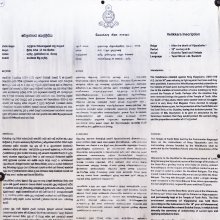Vaat: 1 definition
Introduction:
Vaat means something in Hindi. If you want to know the exact meaning, history, etymology or English translation of this term then check out the descriptions on this page. Add your comment or reference to a book if you want to contribute to this summary article.
Ambiguity: Although Vaat has separate glossary definitions below, it also represents an alternative spelling of the word Vata.
Images (photo gallery)
Languages of India and abroad
Hindi dictionary
Source: DDSA: A practical Hindi-English dictionaryVaat in Hindi refers in English to:—(nm) air; wind-one of the three humours of the body (the other two being [pitta] and [kapha]); gout, rheumatism; ~[kara/kari] producing wind; ~[cakra] a whirlwind; ~[ja] caused or generated by wind; ~[jivi] aerobic; -[prakriti] dominated by the wind humour; -[prakopa] disorder caused by the excess of wind within the system; ~[yukta] aerated; -[ramdhra] lentical; -[roga/dosha/vikara] ailment caused by disorder of the wind within the system, rheumatic ailment; ~[hata] hysteric..—vaat (वात) is alternatively transliterated as Vāta.
...
See also (Relevant definitions)
Starts with (+79): Vaataanukoolit, Vaataavaraniya-nariwad, Vaataavaraniya-rangvaad, Vaataavaraniya-sharnaarthi, Vaataavaranvigyaan, Vaate, Vaathakoddi, Vaathanaarayana, Vaathapotha mara, Vaathavallikodi, Vaathikuntikam vallei, Vata-pittaculai, Vata-ratcatankulikai, Vatacanam, Vatacarati, Vatacepam, Vataciritam, Vataciromani, Vataculai, Vatai.
Full-text (+2471): Vat, Grahavat, Jirnavat, Jatavat, Vyapaditavat, Akshavat, Vishuvat, Suvarnavat, Pratibhavavat, Prajnavat, Bhitavat, Prarthitavat, Tanutravat, Svanavat, Pancamavat, Nabhita, Phenavat, Avyavasayavat, Kakataliyavat, Ayavat.
Relevant text
Search found 69 books and stories containing Vaat, Vat; (plurals include: Vaats, Vats). You can also click to the full overview containing English textual excerpts. Below are direct links for the most relevant articles:
Sahitya-kaumudi by Baladeva Vidyabhushana (by Gaurapada Dāsa)
Text 10.5 < [Chapter 10 - Ornaments of Meaning]
Text 10.6 < [Chapter 10 - Ornaments of Meaning]
Text 10.108 < [Chapter 10 - Ornaments of Meaning]
Rig Veda (translation and commentary) (by H. H. Wilson)
Hindu Architecture and Art in Angkor < [August 1937]
Paper Manufacture in India < [January-February, 1929]
Indian Culture in Cambodia < [January 1957]
Garga Samhita (English) (by Danavir Goswami)
Verse 5.9.11 < [Chapter 9 - The Happiness of the Yadus]
Verse 3.9.37 < [Chapter 9 - The Birth of Śrī Girirāja]
Verse 1.19.17 < [Chapter 19 - Breaking of the Two Arjuna Trees]
Vietnamese Buddhist Art (by Nguyen Ngoc Vinh)
6. Buddhist monuments in Cambodia < [Chapter 2 - Similarity of Buddhist monuments in South Vietnam and South East Asia]
3. History of South East Asia < [Chapter 2 - Similarity of Buddhist monuments in South Vietnam and South East Asia]
4. Buddhist monuments (Introduction) < [Chapter 2 - Similarity of Buddhist monuments in South Vietnam and South East Asia]
Brihad Bhagavatamrita (commentary) (by Śrī Śrīmad Bhaktivedānta Nārāyana Gosvāmī Mahārāja)
Verse 2.4.109 < [Chapter 4 - Vaikuṇṭha (the spiritual world)]
Verse 2.3.164 < [Chapter 3 - Bhajana (loving service)]
Verse 1.7.127 < [Chapter 7 - Pūrṇa (pinnacle of excellent devotees)]
Related products
(+5 more products available)







